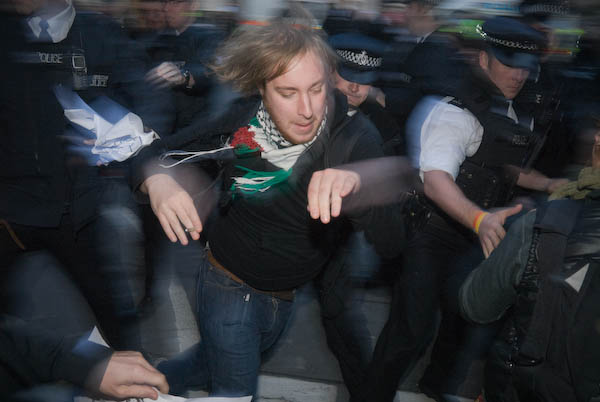BBC news this morning reported that a committee of MPs and peers, the joint committee on human rights has asked that a review of all of our terrorism laws passed – often in great haste – since 9/11 should be “an urgent priority for the next Parliament.”
This jogged my memory about a video that EPUK pointed out in this weeks newsletter. Born Under Punches ( Big Brother mix) is a video around 10 minutes long that puts images and clips from various sources along with text – including quotations from George Orwell, Stella Rimington, Thomas Jefferson, Robert Capa and others to the sound track of “Born Under Punches” by Talking Heads.
It includes some familiar pictures of familiar events – including the killing by police of Ian Tomlinson, a year ago next Thursday and various other events in London where police have clashed with protesters and photographers trying to report the events.

Freedom to Protest demonstration at Downing St, Jan 2008
Robert Capa is best known for his advice that if your pictures are not good enough it’s because you are not close enough, usually interpreted simply in a physical sense in terms of feet and inches, but also I think meaning that you are not sufficiently involved. One of the books that included his work, lurking somewhere on my shelves, was ‘The Concerned Photographer‘ published in 1968, fourteen years after his death, edited by his brother Cornell Capa which also included the work of Werner Bischof, Chim (David Seymour), Andre Kertesz, Leonard Freed and Dan Weiner.
It is this need to get close to the action that often results in friction between photographers and police, and also means that photographers often get a much clearer view of what is happening at events than some other journalists, even many camera crews. While some independents with movie cameras get in there with the photographers – notably Jason N Parkinson, who appears in ‘Born Under Punches’ on both sides of the camera, the news organisations with larger cameras and often two or three people tend to stick to the sidelines and only move in for the more organised ‘photo ops’, sometimes pushing rather rudely in front of us still photographers to do so.
So when – as in the reports of last Saturday’s protest involving the EDL and the UDF – photographers tell a very different story to that put out by the BBC and some other news organisations, you can believe the photographers. They were there, as were some journalists, while the BBC are generally only thereabouts. Photography isn’t just f8 and be there, but both a a sine qua non for photojournalists. Having heard BBC reports of events that I’ve covered in the past, I have no doubts that their reporting is often incomplete, sometimes incompetent and almost always biased.
The BBC does make some excellent programmes (and I often enjoy listening to them on the radio.) I’ve always supported the idea of the BBC and I think it vital to our democracy that we have public service broadcasting and a truly independent news service. But years of covering protest in London have led me to the conclusion that the BBC no longer – if they ever did – provides this. Frankly programmes such as the ‘News Quiz’ and the ‘Now Show’ are often closer to the truth than the news broadcasts or the ‘Today’ programme.
Capa’s quote used in the video was a good one: “The truth is the best picture, the best propaganda.”